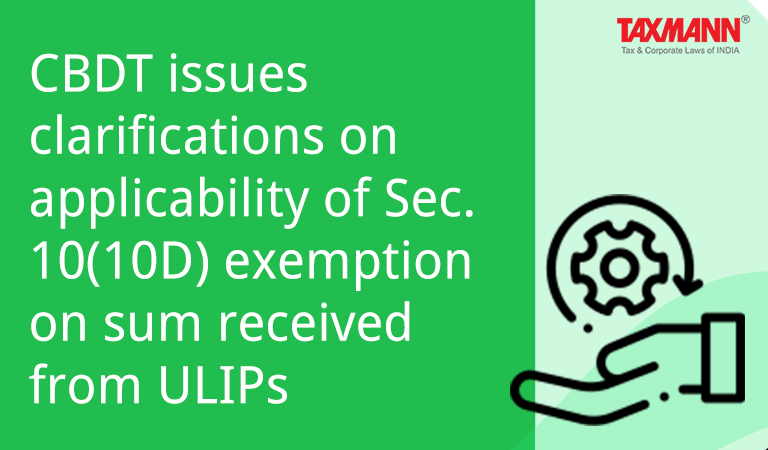CBDT issues clarifications on applicability of Sec. 10(10D) exemption on sum received from ULIPs
- Blog|News|Income Tax|
- 2 Min Read
- By Taxmann
- |
- Last Updated on 20 January, 2022

Circular No. 2 of 2022, dated 19-01-2022
Section 10(10D) provides an exemption for any sum received under ULIP, including the sum allocated by way of bonus on such policy. However, if the premium is paid in excess of the limits prescribed, no exemption will be provided under this section except in case of the policyholder’s death.
Besides restricting the exemption under Section 10(10D) for payment of excess premium, the Finance Act, 2021 has inserted Fourth and Fifth Proviso to Section 10(10D). The Fourth Proviso provides that no exemption shall be available for a policy acquired on or after 01-02-2021 if the premium paid in any year during the tenure of the ULIP exceeds Rs. 2,50,000 (single policy).
The Fifth Proviso provides that if the person has more than one policy acquired on or after 01-02-2021, and the premium payable for each policy during any year does not exceed Rs. 2.5 lakhs, the exemption would be allowed only in respect of those policies whose aggregate premium is within Rs. 2,50,000.
In order to remove any difficulty which arises while giving effect to the provisions of said provisos, the CBDT has issued guidelines with the previous approval of the Central Government. The CBDT has issued the following clarifications:
Condition 1: In prior years, the assessee has not received sum from any eligible ULIP or if sum is received, but assessee didn’t claim any exemption on such sum. In this case, the exemption under section 10(10D) shall be available in the following manner:
(a) If consideration is received from one eligible ULIP, the exemption shall be available to assessee only if the premium payable on such eligible ULIP doesn’t exceed Rs. 2,50,000.
(b) If consideration is recived from more than one eligible ULIPs and the aggregate of the amount of premium payable on such eligible ULIPs exceeds Rs 2,50,000 for any previous year during the term of such ULIPs. In that case, the exemption shall be available only for those ULIPs where the aggregate of the amount of the premium payable does not exceed Rs 2,50,000.
Condition 2: In prior years, the assessee has received sum from any eligible ULIP (old ULIP) and claimed exemption under section 10(10D). In this case, the exemption under section 10(10D) shall be available in the following manner:
(a) If consideration is received from one or more than one eligible ULIPs, the exemption shall be available only if the aggregate amount of premium payable on such eligible ULIPs and old ULIPs does not exceed Rs 2,50,000 for any of the previous year during the term of such eligible ULIPs.
(b) If the aggregate of premium payable on eligible ULIPs and old ULIPs exceeds Rs. 2,50,000, the exemption shall be available only for those eligible ULIPs where the aggregate amount of premium along with the aggregate amount of premium of old ULIPs does not exceed Rs 2,50,000 for any of the previous year during the term of any of such eligible ULIPs.
Click Here To Read The Full Notification
Disclaimer: The content/information published on the website is only for general information of the user and shall not be construed as legal advice. While the Taxmann has exercised reasonable efforts to ensure the veracity of information/content published, Taxmann shall be under no liability in any manner whatsoever for incorrect information, if any.

Taxmann Publications has a dedicated in-house Research & Editorial Team. This team consists of a team of Chartered Accountants, Company Secretaries, and Lawyers. This team works under the guidance and supervision of editor-in-chief Mr Rakesh Bhargava.
The Research and Editorial Team is responsible for developing reliable and accurate content for the readers. The team follows the six-sigma approach to achieve the benchmark of zero error in its publications and research platforms. The team ensures that the following publication guidelines are thoroughly followed while developing the content:
- The statutory material is obtained only from the authorized and reliable sources
- All the latest developments in the judicial and legislative fields are covered
- Prepare the analytical write-ups on current, controversial, and important issues to help the readers to understand the concept and its implications
- Every content published by Taxmann is complete, accurate and lucid
- All evidence-based statements are supported with proper reference to Section, Circular No., Notification No. or citations
- The golden rules of grammar, style and consistency are thoroughly followed
- Font and size that’s easy to read and remain consistent across all imprint and digital publications are applied



 CA | CS | CMA
CA | CS | CMA
